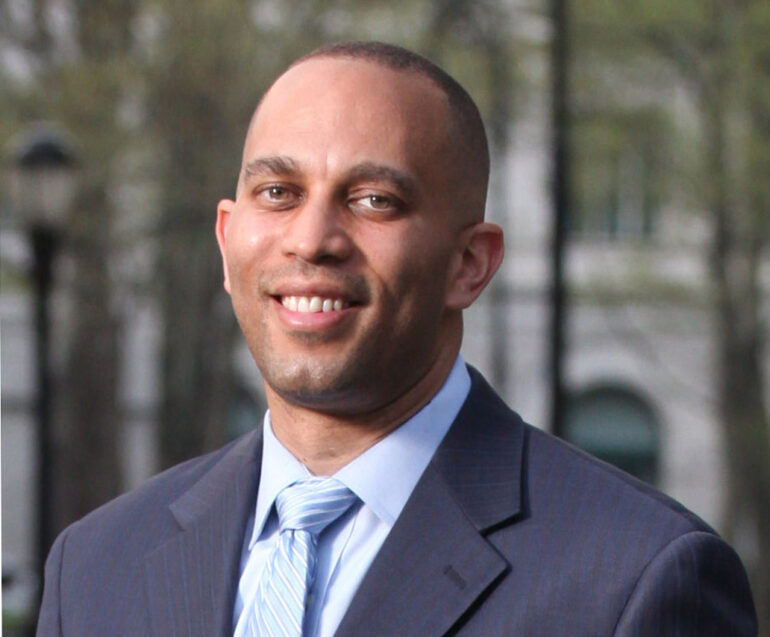House Minority Leader Hakeem Jeffries (D-NY) reportedly faced a tense and highly revealing exchange Friday on CNBC’s Squawk Box, where host Rebecca Quick repeatedly pressed him on whether Democrats truly want a bipartisan agreement to extend Affordable Care Act (ACA) subsidies — or whether they’re playing politics while millions of Americans face rising insurance premiums.
The friction began when Quick pointed out that bipartisan lawmakers, including Rep. Tom Suozzi (D-NY) and Rep. Don Bacon (R-NE), have proposed a one- or two-year extension of ACA subsidies to avoid an end-of-year spike in health care costs. Quick made clear that Democrats’ push for a three-year extension and additional demands would be “dead in the water” without Republican support.
“If you want to get done, you are going to need at least some Republicans to come over,” Quick said. “Why not start with a one-year extension or potentially even a two-year extension?”
Instead of directly answering, Jeffries tried to shift the conversation back to past negotiations during a government shutdown — a move Quick immediately rejected.
“That’s different. I’m talking about what you have now,” she said sharply.
WOW – Watch as Hakeem Jeffries Melts Down LIVE on TV!
The House Minority leader just had a total fit when he received pushback by CNBC's Becky Quick about the expiring Obamacare tax cuts:
Quick: “You are going to need at least some Republicans to come over. Why not start with a… pic.twitter.com/bAAnO8yCKJ
— Conservative Brief (@ConservBrief) November 21, 2025
“You can ask me the question. I’ll provide the answer,” Jeffries snapped.
“Answer the question instead of going back,” Quick pushed, clearly frustrated.
Jeffries then accused Republicans of refusing to engage in earlier subsidy-extension talks. Quick rolled her eyes as he insisted on “providing context.” He defended Democrats’ demand for a multi-year extension, insisting it was “very reasonable.”
Quick responded by openly questioning Jeffries’ motives. She suggested that Democrats might actually prefer to see premiums rise — providing a political weapon against Republicans.
“It’s important context to make me realize that I don’t think you want to get a deal done,” Quick said. “I think this is something where you’d like to see the rates go higher and allow the Republicans to hang themselves with that. Is that the answer? Is this politics?”
Jeffries became visibly irritated, calling the suggestion a “ridiculous assertion” and scolding Quick: “Shame on you for saying that.”
The tension continued as Quick noted the reality: Democrats’ three-year proposal wasn’t going to pass. Jeffries insisted the issue wasn’t partisan, pointing out that many Republican-led states would be hit hardest by subsidy expirations. Quick agreed but said that strengthens the case for a bipartisan compromise — something Democrats have not seriously pursued.
Jeffries claimed Democrats want to sit down and “find common ground,” while accusing Republicans of failing to follow through on commitments made during the shutdown. Quick immediately corrected him, saying, “Mike Johnson never said that,” disputing Jeffries’ claim that the GOP had promised post-shutdown negotiations.
She emphasized that Republicans would work with Democrats on a bipartisan framework — if Democrats would stop making demands they know won’t pass.
Throughout the exchange, Quick repeatedly attempted to bring Jeffries back to the central question: why Democrats refuse to start with a realistic extension instead of a partisan wish list.
Jeffries never conceded the point.
The clash ultimately highlighted what many critics argue is the Democrats’ strategy: stall on a bipartisan deal, allow premiums to spike, and then blame Republicans in an election year. Quick’s willingness to challenge Jeffries directly made the dynamic unmistakably clear.
[READ MORE: White House Tightens Press Access Following Reports of Unauthorized Recordings]





